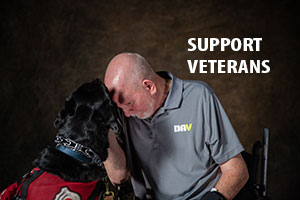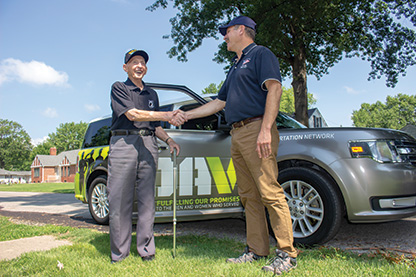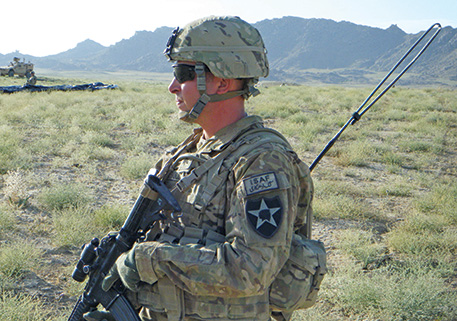Death Benefits for Veterans
When a death in the family happens, all too often, survivors find themselves ill-prepared to cope with the recent loss. Decisions have to be made, and if eligible, paperwork must be submitted to ensure VA benefits are received on the veteran’s behalf.
If you think you might qualify for veterans’ death benefits, a DAV national service officer (NSO) can help you and your family at no charge or obligation. They are experienced with helping to ease the burden when a death in the family occurs.
To find your local DAV office, visit dav.org/veterans/find-your-local-office.
The following list includes benefits some survivors may be entitled to, as well as eligibility requirements and other information you may find helpful.
Burial and plot allowance for a service-connected death
Certain benefits are available to cover burial expenses for any veteran who died as a direct result of a service-connected disability, or those veterans whose service-connected ailment was found by the Department of Veterans Affairs to be a contributing cause to the veteran’s death. Benefits may also extend to some dependents and survivors.
The VA will pay up to an established amount set by law, which is periodically increased toward plot and burial expenses. If a veteran is buried in a VA national cemetery, some or all of the cost for transporting the deceased may be reimbursed.
Burial and plot allowance for a non-service-connected death
If the veteran died on or after Oct. 1, 2019, the VA may pay toward burial and funeral expenses if hospitalized by VA at time of death, or towards burial and funeral expenses if not hospitalized by VA at time of death, and for a plot if not buried in a national cemetery. Amounts paid may adjust year to year as VA now uses the Consumer Price Index for modifications, which began in fiscal year 2013.
If the death occurred while the VA properly hospitalized the veteran, or under VA contracted nursing home care, some or all of the costs for transporting the veteran’s remains may be reimbursed. The VA does not pay burial benefits if the veteran died during active military service, was a member of congress who died while holding office, or was a federal prisoner.
Applying for a pre-need burial determination
Veterans can apply for a pre-need determination on their eligibility to be buried in a VA national cemetery prior to passing, making the burial planning process easier for family members.
For eligibility requirements or more information on this service, visit www.va.gov/burials-memorials/pre-need-eligibility/ or call 877-222-8387.
How to schedule a national cemetery burial
The VA provides veterans and dependents a variety of gravesite options for burial. However, choices are limited depending on the specific cemetery. Options may include full casket burial, columbarium interment (placement in an above-ground structure for cremated remains) or in-ground interment for cremated remains.
While gravesites in national cemeteries cannot currently be reserved, the VA will honor reservations made under previous programs.
To make arrangements for burial at national cemeteries, the funeral director or the next of kin must contact the specific national cemetery in which burial is preferred.
Some spouses, parents and minor children of service members or eligible veterans may be buried in a national cemetery.
Arlington National Cemetery
Since the Department of the Army administers Arlington National Cemetery, eligibility for burial is more restrictive than VA national cemeteries.
Eligibility for in-ground burial is reserved for:
- Service members who died on active duty and their immediate family.
- Military retirees and their immediate family.
- Recipients of the Purple Heart, or Silver Star and above.
- Prisoners of war (POWs) who died after Nov. 30, 1993.
Eligibility for interment in Arlington’s Columbarium Court or Niche Wall includes all those listed above as eligible for in-ground burial, as well as:
- Service members who died on active duty for training only.
- Veterans who served at least one day on active duty other than for training.
- Any member of an armed forces Reserve component, the Army National Guard or the Air National Guard whose death occurs under honorable conditions while on active duty for training or performing full-time service.
For more information, visit arlingtoncemetery.mil or call 877-907-8585.
Note: Due to limited space, only honorably discharged veterans in the above categories are eligible.
State veterans cemeteries
Eligibility requirements are set for each state and may differ from the national cemeteries. For more information, contact the individual state cemetery or state veterans affairs office. To locate a state veterans cemetery, visit cem.va.gov.
Military funeral honors
The Department of Defense is responsible for providing military funeral honors through the Honoring Those Who Served program. Every eligible veteran may receive these honors at a funeral, including folding and presenting a United Stated flag and playing of taps.
Funeral home directors must submit a request for military funeral honors on behalf of the veteran’s family.
The VA National Cemetery Administration can assist with arranging military funeral honors at VA national cemeteries.
Headstones and grave markers
The VA will produce a headstone or grave marker for any unmarked grave of a deceased eligible veteran in any cemetery in the world.
The VA will also provide a single headstone, columbarium niche cover or a flat marker for a veteran’s final resting place at private, state or national cemeteries.
To request a government-provided headstone, marker or medallion, the eligible applicant must submit a VA Form 40-1330, “Claim for Standard Government Headstone or Marker,” or VA Form 40-1330M, “Claim for Government Medallion for Placement in a Private Cemetery,” along with proof of military service.
Dependency and Indemnity Compensation
Surviving spouses, children or parents of a service member who died in the line of duty or from a service-related injury or illness are eligible for tax-free monthly compensation.
To receive Dependency and Indemnity Compensation (DIC), surviving spouses must meet one of the following requirements:
- Married the veteran or service member before Jan. 1, 1957.
- Married the veteran or service member within 15 years of their discharge from military service during which the service-connected illness or injury began or became worse.
- Married to the veteran or service member for at least one year.
- Had a child with the veteran or service member; aren’t currently remarried; and either lived with the veteran or service member without a break until their death or, if separated, weren’t at fault for the separation.
Note: If you remarried on or after Dec. 16, 2003, and you were 57 years old or older at the time you remarried, you can still continue to receive DIC.
Eligibility for surviving children
To receive DIC, surviving children must meet all of the following requirements:
- Not included in the surviving spouse’s DIC.
- Under age 18, or between ages 18 and 23 while attending school.
Children adopted out of the veteran’s family may be eligible for DIC if all other eligibility criteria are met.
Eligibility for surviving parents
To receive DIC, both of the following must be true for surviving parents:
- Biological, adoptive or foster parent of the veteran or service member.
- Income below a certain amount.
Evidence required for DIC
Surviving spouses, children or parents eligible for DIC must submit evidence—documents such as military service records, doctor’s reports and medical test results—that verify one of the following is true for the veteran or service member:
- The service member died from an injury or illness while on active duty or in the line of duty while on active duty for training.
- The service member died from an injury or certain illnesses in the line of duty while on inactive training.
- The veteran died from a service-connected illness or injury.
For surviving spouses or children only, the veteran must have had a 100% permanent and totally disabled rating:
- For at least 10 years before their death, OR
- Since their release from active duty and for at least five years immediately before their death, OR
- For at least one year before their death if they were a former POW who died after Sept. 30, 1999.
Note: “Totally disabled” means the veteran’s illnesses or injuries made it impossible for them to work.
Leaving a legacy gift to DAV
More than a million disabled veterans across the country rely on DAV, America’s oldest and largest organization serving ill and injured veterans from every era. Leaving an impactful and lasting legacy gift will ensure veterans across the country will have access to health care, education, disability and other benefits they’ve earned.
Many options are available to leave a gift to DAV, including through a will or trust, charitable gift annuities, life insurance and retirement policies, and more. It can also be left completely anonymous.
For more information, please feel free to call us at 1-800-216-9802, ext. 1, to request brochures that offer information on giving in greater detail.
You can also visit our website at https://davplanmygift.org/ , for a selection of estate-planning articles.
To leave a gift to DAV, you will need to use our legal name, address and tax identification number, noted below:
DAV (Disabled American Veterans)
P.O. Box 14301
Cincinnati, OH 45250
Tax identification number (EIN): 31-0263168








